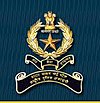Sardar Vallabhbhai Patel National Police Academy
 SVPNPA Logo | |
| Abbreviation | SVPNPA |
|---|---|
| Formation | 15 September 1948 |
| Type | Government agency |
| Legal status | Active |
| Purpose | IPS Officer Training |
| Headquarters | Ministry of Home Affairs, New Delhi |
| Location | |
Region served | India |
Membership | Indian Police Service officers |
Director General | Ms Aruna Bahuguna, IPS |
Parent organisation | Government of India |
| Staff | 427 |
| Website | svpnpa.gov.in |
| Remarks | |
Sardar Vallabhbhai Patel National Police Academy (SVPNPA) Telugu: సర్దార్ వల్లభభాయి పటేల్ జాతీయ పోలీస్ అకాడెమీ, Devanāgarī: सरदार वल्लभभाई पटेल राष्ट्रीय पुलिस अकादमी) is the Indian national institute for training of Indian Police Service (IPS)[2] officers before they are sent to their respective state cadres to carry out their duties. The academy is in Hyderabad, India.[3]
Sardar Vallabhbhai Patel National Police Academy is the premier police training institution in the country.[4]
Training
The National Police Academy (NPA) trains officers of the Indian Police Service, who have been selected through the All-India Civil Services Examination. The trained officers will be posted as Assistant Superintendent of Police (ASP) in their respective states under whom the other sub-ranks of police force will be working.[5] The recruitment of sub-ranks such as constables, sub-inspectors, inspectors, Deputy Superitendent of Police is each state's prerogative and will be done by respective state director generals of police. The IPS cadre is controlled by the Home Ministry of the Government of India and the officer of this service can only be appointed or removed by an order of the President of India.
Apart from the Basic Training Course for IPS officers the Academy conducts three In-service Management Development Programmes for officers of Superintendent of Police, Deputy Inspector General of Police and Inspector General levels of the Indian Police Service; 'Training of Trainers' Courses for the trainers of police training institutions in the country; IPS Induction Training Course for State Police Service Officers; and short specialised thematic courses, seminars and workshops on professional subjects for all levels of police officers. Foreign police officers and other officers belonging to IRS/IAS/IFS/Judiciary/CAPF, public sector undertakings, nationalised banks, insurance companies etc. also attend specialised courses conducted here from time to time. The academy is affiliated to Osmania University for conducting courses on police subjects for IPS officers.
History
The academy was established on 15 September 1948 and was named after India's former Deputy Prime Minister Sardar Vallabhbhai Patel who was the man responsible for creating the All India Services and for establishing a training institution to train IPS officers.
President's colours
In recognition of the outstanding achievements of the academy and its service to the nation, the academy received the President's Colours on its 40th anniversary on 15 September 1988.
Organisation
The Academy is headed by a Director, an IPS officer of the rank of Director General of Police or Commissioner of Police (State) (3-star rank) and assisted by two joint directors of the rank of Inspector General of Police or joint commissioner of police (2-star rank), three deputy directors of the rank of Deputy Inspector General of Police or additional commissioner of police (1-star rank), and 13 assistant directors. The assistant directors include eight IPS/SPS officers of the rank of superintendent of police from state cadres, a Forensic Scientist, a Judicial Service Officer, a specialist each in Training Methodology, Computers and Wireless. The sanctioned strength of the faculty includes management professors, reader in Behavioural Sciences, reader in Teaching Methodology, medical officers, junior scientific officer, Hindi instructor, photographic officer and chief drill instructor. The supporting staff include administrative, ministerial and medical staff and other Group D employees.
Academy board
A high-level Academy Board comprising senior civil/police officers, eminent educationists etc. as its members is headed by the Union Home Secretary. The board periodically reviews inter-alia the syllabi and training methodology of courses.
See also
- Indian Police Service
- Law enforcement in India
- Indian Police Foundation and Institute
- Bureau of Police Research and Development
- National Crime Records Bureau
- NDCRTC
References
- ^ SVPNPA 2010, News Letter. "News Letter 2010 Page Number 15" (PDF). http://www.svpnpa.gov.in. SVPNPA. Retrieved 13 December 2014.
{{cite web}}: External link in|website= - ^ "Sardar Vallabhbhai Patel National Police Academy team on bicycle tour". The Times Of India. 27 November 2009.
- ^ http://www.svpnpa.gov.in/
- ^ "Virtual classroom proposed for linking police training centres". The Hindu. n.d. Retrieved 3 May 2012.
- ^ "Sardar Vallabhbhai Patel National Police Academy". About Academy. Sardar Vallabhbhai Patel National Police Academy. Retrieved 10 August 2012.
External links
